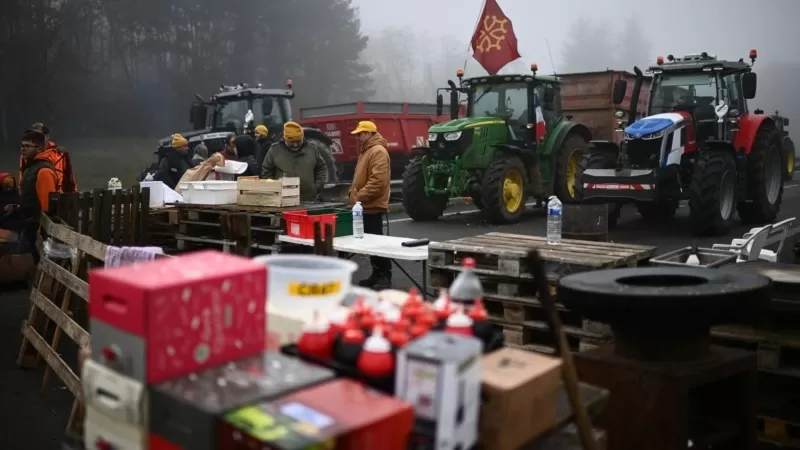PARIS — The French farming community is not backing down from their protests, despite the government’s recent announcement of measures that they believe fall short of their demands. The farmers, who are seeking fair payment for their produce, less bureaucracy, and protection against cheap imports, have taken to the streets and highways across the country, using their tractors to block traffic and make their voices heard.
The protests have caused major disruptions, with long stretches of road being shut down and traffic being slowed. In addition, protesters have also resorted to dumping agricultural waste at the gates of government offices. While some barricades have been lifted, the A7 highway in southern France and some other roads remain partially closed.
The highway operator Vinci Autoroutes reported that the blockades on two highways leading to Paris have been removed, and the Lyon to Bordeaux highway has also reopened. However, some angry protesters are planning to escalate the protests by blocking traffic around Paris for several days, starting from Sunday evening.
The farmers’ grievances have not gone unnoticed by the government, as President Emmanuel Macron’s new prime minister, Gabriel Attal, announced a series of measures during a visit to a cattle farm in southern France on Friday. These measures include simplifying certain technical procedures and gradually ending diesel fuel taxes for farm vehicles.
Attal also confirmed that France will continue to oppose the European Union signing a free-trade deal with the Mercosur trade group, as French farmers believe it will lead to unfair competition from Latin American countries. The agreement has been under negotiation for years.
However, the two major farmers’ unions in France have rejected the government’s plan, stating that it does not go far enough to address their concerns. This shows that the protests are not just about the current situation, but also about the future of the agricultural sector in France.
The protests in France are not an isolated incident, but rather a reflection of the discontent among farmers in other European countries as well. The heavily subsidized and influential agricultural sector has become a hot-button issue ahead of the European Parliament elections in June. Populist and far-right parties are hoping to capitalize on the rural dissatisfaction with free trade agreements, high costs exacerbated by the conflict in Ukraine, and other grievances.
In recent weeks, farmers in Germany, the Netherlands, Poland, and Romania have also taken to the streets to voice their concerns. This shows that the issue is not limited to one country, but rather a common struggle for farmers across the European Union.
The French farmers’ protests have brought attention to the challenges faced by the agricultural sector, and it is important for the government to take their demands seriously. The farmers are the backbone of the country, providing food for the nation and contributing to the economy. Their concerns must be addressed in a timely and effective manner.
The protests also highlight the need for a fair and sustainable agricultural policy in the European Union. The current system, which heavily favors large-scale industrial farming, has led to the decline of small and family-owned farms. This not only affects the farmers, but also has a negative impact on the environment and the quality of food produced.
It is time for the European Union to prioritize the needs of its farmers and work towards a more equitable and sustainable agricultural policy. The protests in France serve as a wake-up call for the government and the EU to take action and address the concerns of the farming community.
In conclusion, the French farmers’ protests are a powerful demonstration of the determination and resilience of the agricultural sector. They are not just fighting for their own livelihoods, but also for the future of farming in France and the European Union. It is important for the government to listen to their demands and take concrete steps towards finding a solution that benefits both the farmers and the country as a whole. Let us hope that a positive outcome can be reached through dialogue and cooperation between the government and the farmers.


